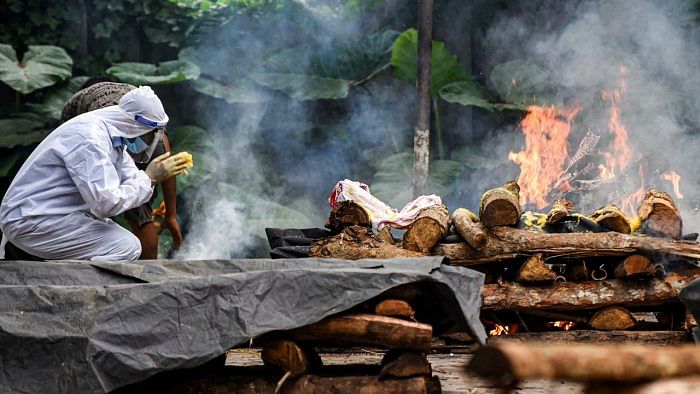
At 9:45 pm, alarms blared across the Intensive Care Unit of Jaipur Golden Hospital. Over two dozen patients on ventilators couldn’t breathe. Some flailed their arms and legs. Others cried for help, choking sounds coming from their throats as if they were being strangled. Mechanics sprinted to the maintenance room to see what was wrong. Nurses grabbed small plastic pumps to fill the lungs of critically-ill patients by hand. It wasn’t enough.
Jaipur Golden, a respected hospital in Delhi, had run out of medical oxygen. Over the next seven hours, 21 Covid-19 patients died.
“Nobody can forget that night,” said Shaista Nigar, the hospital’s nursing superintendent. “It was a total breakdown.”
Across India, amid a devastating second wave of Covid-19, hospitals ran out of beds and critical supplies, contributing to the deaths of thousands of people and leaving behind a traumatic memory to haunt them for life. The second wave of the Covid-19 pandemic witnessed more than 40 per cent higher level of hospital fatality in India, according to a nine-hospital study, which found that the maximum death rate happened among those who are less than 45 years of age.
As the number of Covid-19 cases is declining steadily, hospitals are breathing, states are easing lockdown and the government is racing to vaccinate the targetted 95 crore people by December-end.
The nation is ramping up measures for a possible third wave of Covid-19, in which children are likely to be affected, and states are also doing their bid to tackle the next wave of the pandemic in a better way. Punjab has assigned unique identity numbers to all the oxygen cylinders and oxygen concentrators available in the state. The move will help the officials monitor real-time an oxygen cylinder from the time an order has been placed to its delivery. Maharashtra is training thousands of health workers in how to care for children afflicted with coronavirus. The state, home to the financial capital of Mumbai, was the worst hit by a devastating second wave of infections in April and May that killed lakhs, and is still reporting a quarter of all new cases nationwide.
Unlike after the first wave, states are being cautious about completely lifting the Covid-19-forced restrictions with many extending the curbs to prevent the spread of the virus. Karnataka has tightened the rules for travellers from Maharashtra, which is reporting an increase in the number of Covid-19 cases. Maharashtra recorded 8,085 new cases of Covid-19 on Tuesday, taking the state-wide tally to 6,051,633. The B S Yediyurappa-led government has ordered that all people entering Karnataka from Maharashtra need to produce a negative RT-PCR report or show proof that they have received at least one dose of the Covid-19 vaccine.
On the Covid-19 vaccine front, the government of India added another vaccine to its arsenal against the virus. On Tuesday, the Drugs Controller General of India
(DCGI) granted permission for emergency use of Moderna's Covid-19 vaccines. The government said it is in talks with Pfizer and Johnson & Johnson as it seeks to step up the vaccination drive after a devastating second wave of the pandemic. The DCGI approved the application of pharma major Cipla to import “ready to inject” Moderna vaccines, making it the fourth Covid-19 jab to be available in the country after Covishield, Covaxin and Sputnik V.
Meanwhile, the Brazilian government on Wednesday announced the suspension of its 2 crore dose Covid-19 vaccine contract with Bharat Biotech following allegations of irregularities in the deal, with the Indian drugmaker insisting that it has not received any advance payments.
Even as the Covid-19 vaccination process is under way across the globe, scientists and researchers have been conducting studies on vaccines to understand their immune responses. A recent Oxford study found that a mixed schedule of vaccines where a shot of Pfizer's Covid-19 vaccine is given four weeks after an AstraZeneca shot produces better immune responses than giving another dose of AstraZeneca. The study, called Com-COV, compared mixed two-dose schedules of Pfizer and AstraZeneca vaccines, and found that in any combination, they produced high concentrations of antibodies against the coronavirus spike protein.
A survey that has brought some respite to healthcare officials in India is the one where the officials found that more than 50 per cent of the paediatric population in healthcare settings in Mumbai has antibodies to Covid-19. According to the latest sero-survey conducted by the Brihanmumbai Municipal Corporation (BMC) ahead of the third wave, the proportion of the paediatric population having antibodies increased as compared to earlier sero-survey conducted during the first wave and second wave.
India has so far vaccinated half of its senior citizens with at least one dose, which would partially protect them from the virus, health officials said here on Tuesday. India has an estimated 13.8 crore individuals the age of 60 years and above, of which 49 per cent received at least one dose of the vaccine. The vaccination for this group – considered high risk due to their age – began in February third week marking the second phase of the campaign.
Even as the nation's single-day Covid-19 deaths have fallen below the 1,000 mark, the debate over underreporting of Covid fatalities continues, especially after happenings like bodies floating in the Ganga river or just thrown from bridges, with some estimates suggesting the actual fatalities can be as high as 10 times the reported number. Economists at SBI on Wednesday said that shortfall in reporting deaths is not a new phenomenon in India. One of the prime reasons for the underreporting is because many of the demises happen without any medical attention and hence, ramping up the health infrastructure is the key to manage the jigsaw, they said.